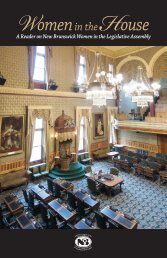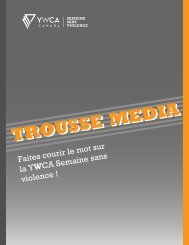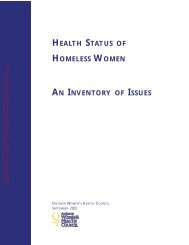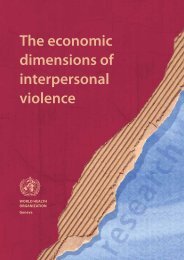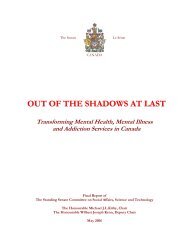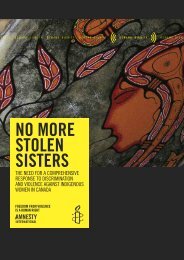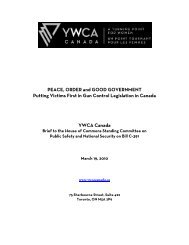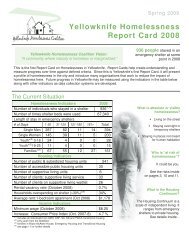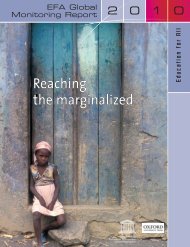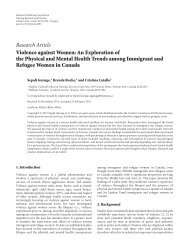Gender Report Card on the International Criminal ... - YWCA Canada
Gender Report Card on the International Criminal ... - YWCA Canada
Gender Report Card on the International Criminal ... - YWCA Canada
Create successful ePaper yourself
Turn your PDF publications into a flip-book with our unique Google optimized e-Paper software.
Trial Proceedings<br />
Moreno-Ocampo:<br />
I think your questi<strong>on</strong> was very<br />
important, <strong>the</strong> (*indiscernible)<br />
submissi<strong>on</strong> of <strong>the</strong> Prosecutor is very<br />
important <strong>on</strong> this point. I have to be<br />
clear. We agree with <strong>the</strong> Chamber idea:<br />
<strong>the</strong>ir act, <strong>the</strong>y are not used in hostility.<br />
However, factually we believe when a<br />
commander is ordered to abduct girls<br />
to use <strong>the</strong>m as sexual slaves or rape<br />
<strong>the</strong>m, this order is using <strong>the</strong> children<br />
in hostility. That is <strong>the</strong> submissi<strong>on</strong> we<br />
are doing. So to summarise, we agree<br />
with <strong>the</strong> Chamber that <strong>the</strong>re is a line,<br />
<strong>the</strong>re’s a border between hostilities<br />
and no hostilities, and cooking could be<br />
a good example, maybe, but ordering<br />
to abduct girls in order to rape <strong>the</strong>m<br />
is an order to – and use children in<br />
hostilities. Thank you. 1145<br />
After Moreno-Ocampo had <strong>on</strong>ce again taken his<br />
seat, Judge Fulford said: ‘That’s very clear. I’m<br />
not sure if it’s <strong>the</strong> same as <strong>the</strong> submissi<strong>on</strong> given<br />
by Ms Sams<strong>on</strong>, but n<strong>on</strong>e<strong>the</strong>less, your positi<strong>on</strong> is<br />
clear, Mr Ocampo’. 1146 Moreno-Ocampo replied:<br />
‘Yes, because I am <strong>the</strong> Prosecutor, I think <strong>the</strong><br />
Chamber should take my word as <strong>the</strong> positi<strong>on</strong> of<br />
<strong>the</strong> office.’ 1147 After a pause, Judge Fulford said,<br />
‘I’m going to ignore that last remark’. 1148<br />
Lubanga’s alleged individual criminal<br />
resp<strong>on</strong>sibility<br />
Trial lawyer for <strong>the</strong> Prosecuti<strong>on</strong>, Manoj<br />
Sachdeva, subsequently provided an overview<br />
of <strong>the</strong> evidence that was intended to prove <strong>the</strong><br />
knowledge, intenti<strong>on</strong> and individual criminal<br />
resp<strong>on</strong>sibility of Lubanga. He argued that<br />
Lubanga was President and Commander-in-<br />
Chief of <strong>the</strong> UPC, and made final decisi<strong>on</strong>s<br />
and dictated <strong>the</strong> strategy and policy of <strong>the</strong><br />
hierarchical UPC and its military wing, <strong>the</strong> FPLC.<br />
1145 ICC-01/04-01/06-T-356-ENG, p 55 lines 11-21.<br />
1146 ICC-01/04-01/06-T-356-ENG, p 55 lines 22-24.<br />
1147 ICC-01/04-01/06-T-356-ENG, p 55 line 55; p 56 line 1.<br />
1148 ICC-01/04-01/06-T-356-ENG, p 56 lines 2-4.<br />
The Prosecuti<strong>on</strong> thus argued that he had both<br />
functi<strong>on</strong>al and de facto c<strong>on</strong>trol over all levels<br />
of <strong>the</strong> organisati<strong>on</strong>, 1149 <strong>the</strong>refore proving his<br />
‘essential c<strong>on</strong>tributi<strong>on</strong>’ to <strong>the</strong> commissi<strong>on</strong> of<br />
<strong>the</strong> crimes charged pursuant to Article 25(3)(a)<br />
of <strong>the</strong> Rome Statute. 1150 The Prosecuti<strong>on</strong> argued<br />
that <strong>the</strong> crimes were committed with Lubanga’s<br />
direct intenti<strong>on</strong> and his knowledge: Lubanga<br />
was regularly put <strong>on</strong> notice of <strong>the</strong> crimes<br />
committed and was in a positi<strong>on</strong> to order <strong>the</strong>ir<br />
cessati<strong>on</strong>. 1151 The Prosecuti<strong>on</strong> noted that: he<br />
had children in his own pers<strong>on</strong>al protecti<strong>on</strong><br />
unit; he took charge of recruitment activities;<br />
he went to Rwampara training camp, where<br />
he addressed and encouraged soldiers; he was<br />
resp<strong>on</strong>sible for military appointments and <strong>the</strong><br />
planning of military operati<strong>on</strong>s; and, he had<br />
regular military meetings with commanders and<br />
his Chief and Deputy Chief of Staff. Fur<strong>the</strong>rmore,<br />
<strong>the</strong> Prosecuti<strong>on</strong> argued that <strong>the</strong> supposed<br />
demobilisati<strong>on</strong> decrees, which it claimed were<br />
intended to provide a cover-up for <strong>the</strong> crimes<br />
being committed, proved Lubanga’s knowledge<br />
of <strong>the</strong> presence of child soldiers within his<br />
military. 1152<br />
In its closing brief, <strong>the</strong> Prosecuti<strong>on</strong> also set<br />
forth <strong>the</strong> legal criteria and evidence to support<br />
its <strong>the</strong>ory of co-perpetrati<strong>on</strong>. The objective<br />
element of <strong>the</strong> crime of co-perpetrati<strong>on</strong> is <strong>the</strong><br />
existence of a comm<strong>on</strong> plan over which <strong>the</strong><br />
accused had functi<strong>on</strong>al c<strong>on</strong>trol. Subjectively,<br />
<strong>the</strong> crime requires that <strong>the</strong> accused acted with<br />
intent and had <strong>the</strong> requisite knowledge to do<br />
so. The Prosecuti<strong>on</strong> argued that, <strong>the</strong> accused<br />
‘exercised functi<strong>on</strong>al c<strong>on</strong>trol over <strong>the</strong> crimes<br />
1149 ICC-01/04-01/06-T-356-ENG, p 27 lines 8-14; ICC-01/04-<br />
01/06-2748-Red, paras 250-285.<br />
1150 Article 25(3)(a) provides: ‘In accordance with this Statute,<br />
a pers<strong>on</strong> shall be criminally resp<strong>on</strong>sible and liable for<br />
punishment for a crime within <strong>the</strong> jurisdicti<strong>on</strong> of <strong>the</strong><br />
Court if that pers<strong>on</strong>: (a) Commits such a crime, whe<strong>the</strong>r<br />
as an individual, jointly with ano<strong>the</strong>r or through ano<strong>the</strong>r<br />
pers<strong>on</strong>, regardless of whe<strong>the</strong>r that o<strong>the</strong>r pers<strong>on</strong> is<br />
criminally resp<strong>on</strong>sible.’<br />
1151 ICC-01/04-01/06-T-356-ENG, p 27 lines 19-25.<br />
1152 ICC-01/04-01/06-T-356-ENG, p 32 lines 6-16; ICC-01/04-<br />
01/06-2748-Red, paras 286-348.<br />
209







